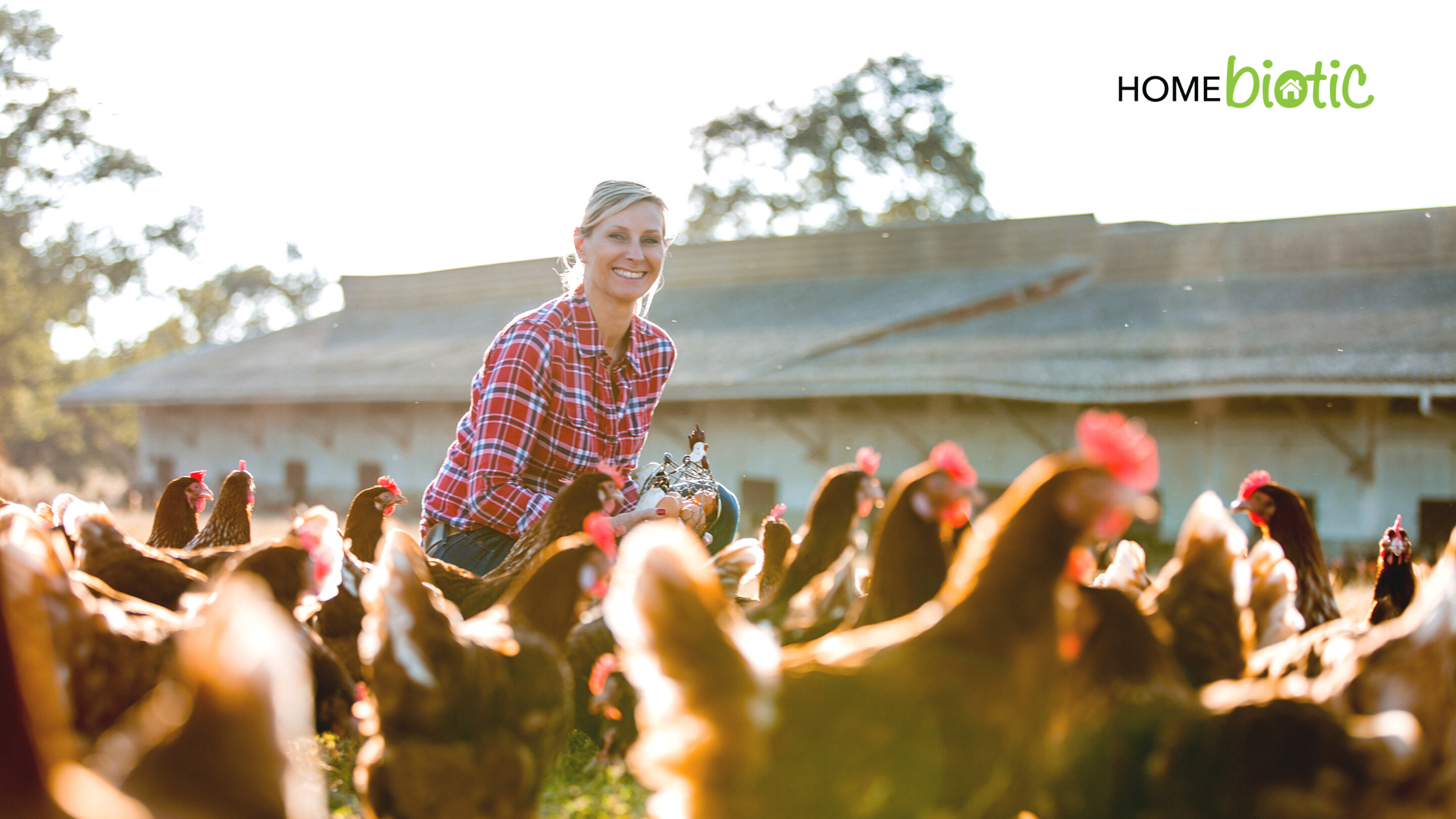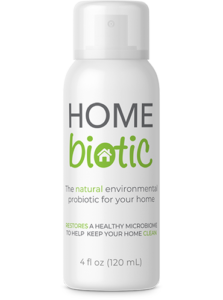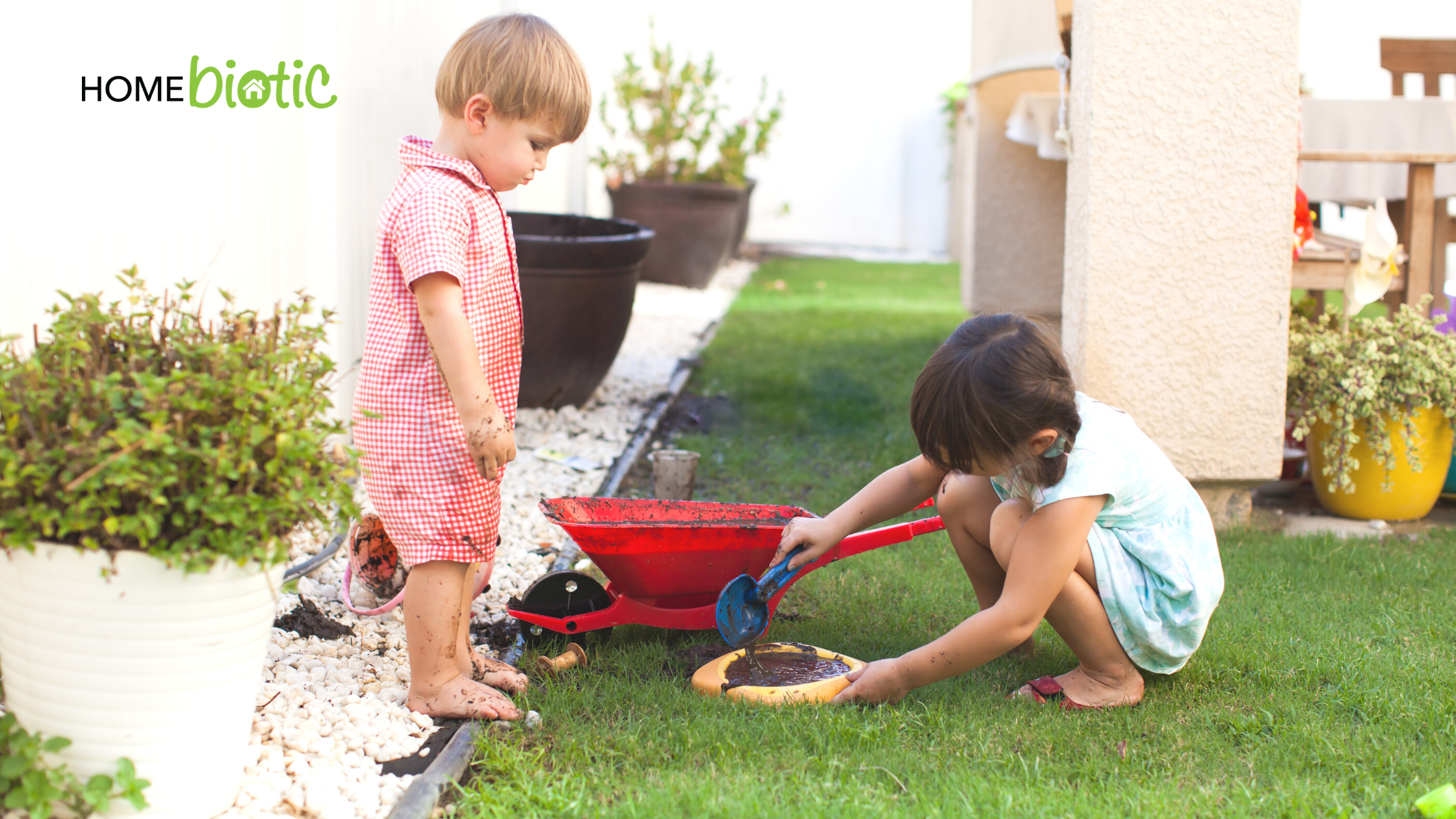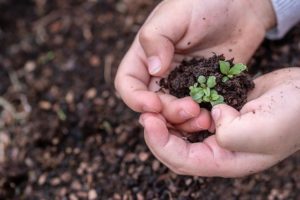The “Farm Effect” & How It Can Create A Healthy Home

Some people will read the title of this article and wonder, “what do farms have to do with the health of my home?” Don’t worry, no one is saying we need to live on farms. Unless, of course, we’re interested in being a farmer. However, a little education about the “farm effect” can have huge benefits to the health of our homes and the people who live in them.
WHAT IS “FARM EFFECT”?
The “farm effect” was founded by researcher Dr. Erika Von Mutius after doing several studies on children raised on farms. The results showed that these children have less incidence of asthma, allergies, and other illnesses. It appears that infants and children are protected from certain allergic and autoimmune diseases when they live close to animals, farm dust, and soil1,2,3.
The “farm effect” was founded by researcher Dr. Erika Von Mutius after doing several studies on children raised on farms. The results showed that these children have less incidence of asthma, allergies, and other illnesses. Share on XSo the “farm effect” refers to the positive health outcomes of living on a farm. The results of these studies are undeniable, and many scholars and regular people are wondering how we can use this information to enhance our modern lives.
No doubt, most of us live in closed-off urban homes that barely resemble a farm environment. So how can we replicate these positive health outcomes so that modern humans can have these health benefits without living on a farm? First, let’s look at how the “farm effect” actually works.
 HOW DOES THE “FARM EFFECT” WORK?
HOW DOES THE “FARM EFFECT” WORK?
The most important thing to know is that it’s not the farm itself that creates the “farm effect,” it’s the microbes. It appears that living amongst many diverse bacteria, such as those found on a farm, has an enhancing effect on the immune systems of growing children. What that means is that microbes help train their budding immune systems to respond to allergens and bacteria in a healthy way2,3.
The repeated exposures to soil, animals, and other farm microbes help to develop specific white blood cells and other immune factors involved in inflammation and allergic reactions. In essence, the more the immune system is trained, the less it reacts to allergens.
It also means that the more developed the immune system is, the less inflammation will be present in the body. And as we are learning more and more, inflammation may be at the root of many common illnesses and conditions2,3,4.
The repeated exposures to soil, animals, and other farm microbes help to develop specific white blood cells and other immune factors involved in inflammation and allergic reactions. Share on XKnowing all of this, we can make different choices about how to take care of ourselves and our environment, including the place we spend the most time in – our homes. In short, we want to replicate the “farm effect” in our homes.
 WHY DO I WANT TO REPLICATE THE “FARM EFFECT” IN MY HOME?
WHY DO I WANT TO REPLICATE THE “FARM EFFECT” IN MY HOME?
As much as possible, we want to improve the diversity of microbes in our homes so they resemble the microbes you would find on farms. These are called soil-based microbes, or bacteria, and they benefit us on many levels. Not only do they help improve our health and immune systems, but they balance out mold and bacteria that may grow unchecked in our homes2,4,5,6.
It may be confusing to read that you need more bacteria when trying to reduce unwanted bacteria, but this is an actual fact. Soil-based bacteria naturally compete with other pathogens creating a healthy balance7.
Replicating the “farm effect” in our homes means bringing in more soil-based microbes. It may sound complicated, but it’s easier than you would think. It involves a few changes and making decisions about which products we buy to clean and protect our homes.
Soil-based microbes in our home can help us achieve a kind of “farm effect.” And this will help improve our immune systems while providing a balance against pathogens like mold and harmful bacteria.

HOW CAN I BRING THE BENEFITS OF THE “FARM EFFECT” INTO MY HOME?
First, we need to have an environment that’s welcoming to soil-based microbes.
If our homes have an unwelcoming environment, then the healthy bacteria will be killed off before they have a chance to do their work. This means that we need to make decisions about cleaning products.
Research has shown that over-cleaning and using toxic chemicals can decimate both good and bad microbes8,9. So maybe we can relax a bit on how clean we need our homes to be. That’s not to say that we let dirt and grime build-up, instead, we just go a little lighter on our cleaning efforts. This has a positive side-effect of decreasing stress too.
Also, go easy on the harsh and toxic cleaners that contain antimicrobial agents.
Instead, opt for more enviro-friendly cleaners, such as Homebiotic Surface Cleaner, which won’t strip away your home’s vital bacterial defense. Harsh cleaning products have been shown to cause respiratory, skin, and eye problems as well as increasing bacterial resistance to these chemicals.
 Next, we need to bring in more soil-based microbes, and there are a few ways that are not only fun but easy.
Next, we need to bring in more soil-based microbes, and there are a few ways that are not only fun but easy.
We can simply start by going outside more and having a hands-on experience with nature. We can let ourselves, our children and our pets play in the mud; roll in leaves, sit down on the grass, or whatever helps us get more intimate with nature2,4.
We may not live on farms, but we can access a similar environment by just spending more time outside and being less afraid of the outside coming in. Having said that, we can open our windows more and maybe adopt some plants that can add more green to our environment. Plants can bring in soil-based microbes, but they also have other properties that help develop our immune systems and decrease dangerous pathogens as well2,4.
 Lastly, products like Homebiotic are made specifically to help replicate the “farm effect” in our homes.
Lastly, products like Homebiotic are made specifically to help replicate the “farm effect” in our homes.
The spray contains diverse soil-based microbes that act as a probiotic for your home. Once you clean with a natural, non-toxic cleaner, you can spray Homebiotic Probiotic Spray in all corners of your home.
Homebiotic Probiotic Spray can help create a balanced ecosystem in your home that resembles the “farm effect.” It may be easier than we think to replicate the “farm effect” in our homes; all we have to do is get educated, then take action.
REFERENCES
1.https://www.ncbi.nlm.nih.gov/pubmed/21060319
2.https://letthemeatdirt.com
3.https://www.ncbi.nlm.nih.gov/pubmed/31401285
4.https://www.harpercollins.ca/9780062433640/eat-dirt/
5.https://err.ersjournals.com/content/27/148/170137
6.https://www.sciencedirect.com/science/article/abs/pii/S1471490615000022
7.https://escholarship.org/content/qt68c2j665/qt68c2j665.pdf
8.https://journals.plos.org/plosone/article?id=10.1371/journal.pone.0064133
9.https://jamanetwork.com/journals/jamadermatology/article-abstract/478930



 WHAT IS HEALTHY DIRT?
WHAT IS HEALTHY DIRT? Balance is essential because a microbiome that lacks balance will have microbes that have either decreased in numbers or and have over-grown. An unbalanced microbiome is called dysbiosis and can cause a range of health or environmental issues5,6.
Balance is essential because a microbiome that lacks balance will have microbes that have either decreased in numbers or and have over-grown. An unbalanced microbiome is called dysbiosis and can cause a range of health or environmental issues5,6.
 CONCLUSION
CONCLUSION